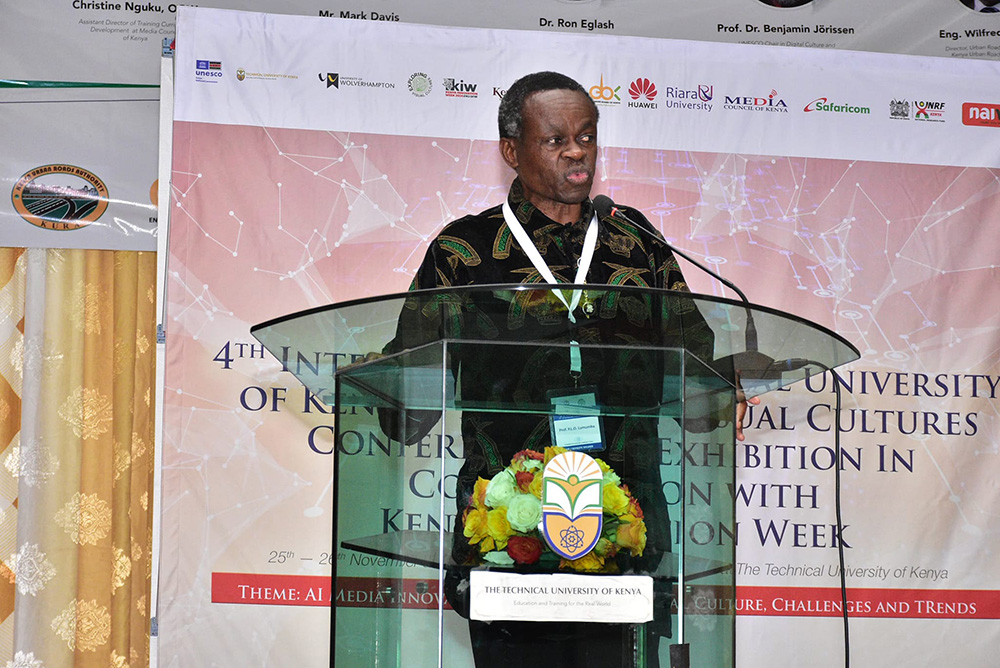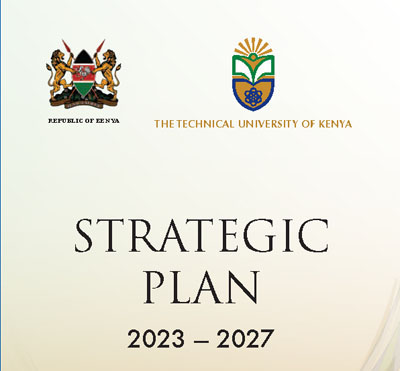AI should be used to benefit the society and not as a destructive tool - Keynote speaker, Prof P.LO Lumumba’s call to action.
The 5th International Conference hosted by the Technical University of Kenya, Exploring Visual Cultures and the Kenya Innovation Agency, kicked off with powerful insights from our keynote speakers. This year’s event, themed AI Media Innovations, Applications, Visual Culture, Challenges, and Future Trends, and hosted at the University began on the 27th Nov 2024 and ended on the 29th Nov 2024.
The Vice-Chancellor, Prof. Benedict Mutua, who officially opened the conference said the conference’s theme was timely. He further added that as the conference explores intersections of AI, media, visual cultures, participants must make a lot of effort in controlling its challenges while making opportunities out of them. He also opined that while the conference fosters dialogues and innovations around AI it should not just be focused on STEM but also STEAM courses.
The keynote speaker, Prof P.L.O Lumumba, emphasised that the conference was giving meaning to a very important subject of visual cultures, and Africa must keep up with changing technologies while embracing the fourth and fifth industrial revolution. He further emphasised that AI should be used to benefit the society and not as a destructive tool.
“The imagination was that the atom would only be used for good. The world, in her stupidity, saw the destruction of populations, and the impact of the split of the atom still lives with the Japanese today. It is equally true that nuclear energy has been used for good and the world is richer for it. When the Chernobyl Nuclear facility malfunctioned, Eastern Europe will tell you how it affected them,” he stressed.
“About visual arts, as we talk about artificial intelligence, it must be situated in the real world. The real world is today a world where, in the Middle East, human beings are bombing each other on a daily basis using the fruits of their intellect, because that is what the missiles and the bombs are, fruits of our intellect and creativity,” Prof Lumumba retorted.
“Human beings are capable of great good and great evil, so, as we gather here today, we must be aligned to that reality,” said Prof. Lumumba.
Additionally, Prof Lumumba also stressed that Africa must keep up with the constantly changing technology, lest we miss out on its benefits and are exploited by it.
“The fifth industrial revolution of things and robotics is already here with us. We must not be visitors. We must be there, we must be at the dinner table and there are two ways in which you are at the dinner table. You are either at the diner or you are on the menu,” Prof PLO Lumumba implored.
Other speakers also gave their insights on what they expect from the conference and partnerships.
Dr. George Eshiamwata, who represented the CEO of the Kenya National Commision for UNESCO said: “Artificial intelligence is profoundly shaping creative industries and visual cultures by transforming artistic processes. It is no longer just a tool for efficiency, but it is a collaborator in the creative process. It empowers artists, designers, and all people involved in cultural production.”
He urged participants to ensure discussions and solutions are centred around preserving human intuition and ingenuity when using AI.
“The relationship between AI and human creativity should be seen as cooperative, as such it is important that the human touch and intuition remains the best of both in shaping digital cultures and communities.”
Dr. Avi Sooful, Chair of the Expert Panel, Exploring visual cultures, extend her gratitude to the conference’s influential partners, adding that their collaboration had enhanced the creation and investment of knowledge, benefiting not only ourselves but also businesses and students.
The Deputy Vice Chancellor, Prof. Alfred Orina said the conference marked a pivotal step in harnessing AI's transformative power across education, healthcare, media, arts, and sustainability, and the University is proud of hosting such an event. He emphasised that Students and innovators should be at the forefront to inspire innovation.
Prof. Peter Matu, the Executive Dean of the Faculty of Social Sciences and Technology, emphasised the urgency of embracing AI, likening ignorance of it to an ostrich hiding its head in the sand.
Meanwhile, Prof. Cleophas Maende, the Executive Dean of the Faculty of Engineering and the Built Environment, highlighted AI's critical role in engineering and expressed hope for that the conference will enrich discussions and experiences will be shared.



